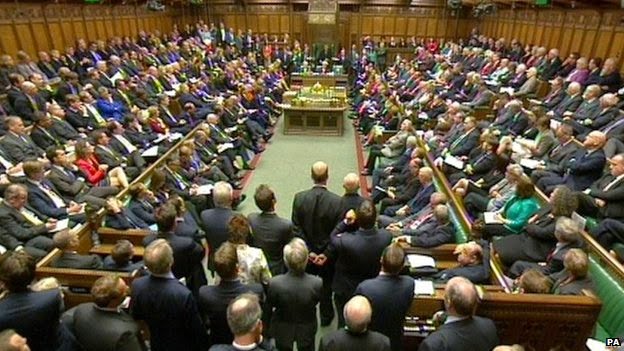On
Friday 26th September 2014, MPs approved UK military intervention in Iraq against Islamic State of Iraq and the Levant (ISIL) by 524 to 43 votes.
This enables the UK government to
join the USA in carrying out air strikes on Iraq and the aim is to weaken 'ISIL' forces, responsible for various atrocities.
But
the attack may strengthen them instead.
'ISIL' (a so-called Islamic State of Iraq and the Levant that misuses religion to pursue power) has sparked
widespread revulsion after releasing videos of western hostages being beheaded
and other abuses include persecuting religious minorities.
Unsurprisingly,
many people back military action.
However it is important to question why 'ISIL' has been so keen to publicise its own
atrocities, in ways that make it an obvious target for attack.
One
purpose of such videos is presumably to spread terror in the areas 'ISIL' controls
or is trying to seize and another is to bolster its prestige.
However
it seems likely that commanders wish to encourage an attack by the USA and
allies.
This
may not be simply down to fanaticism or bravado but rather a considered
decision that the benefits may outweigh the disadvantages.
While
some people are attracted by 'ISIL’ claims, its narrowness and brutality have
met local resistance and to regain popularity, Isis may be seeking to exploit
the hostility triggered by a display of western military might, with resulting
casualties.
The Middle East policy of the USA has largely focused on the interests of oil
companies and, to some extent, the arms industry. Out of self-interest
dictators have been fêted and toppled, international law upheld and defied.
'ISIL' may wish to pose as an heroic defender of Arab and Muslim honour, bombarded by
the same superpower (backed by its UK sidekick) which underwrote the
devastation of Gaza and this may divert attention from its misdeeds and assist
it in smearing its critics as stooges of the west.
Just
as images of civilians executed by 'ISIL' have sparked widespread revulsion, so may
pictures of the bodies of women and children blasted by US or UK bombs and the
propaganda advantages may outweigh the military drawbacks.
Western
governments indeed face a difficult situation, in that their prestige may be
damaged and commercial confidence affected if they are not seen to take strong
measures and yet even on grounds of pragmatic self-interest, it might be wise
not to dance to 'ISIL’ tune.
A
drive to promote human rights on a principled basis would probably be more
effective in undermining 'ISIL’ power.
In
the late 1940s, Muslim and Middle Eastern statespersons, scholars and others,
along with those of other faiths and nations, helped to develop a Universal Declaration of Human Rights covering economic and social as well as political
rights.
Since
then internationally many people, of various religions and none, have helped to
develop thinking and practice that advances rights for all, including those at
greatest risk of injustice and violence.
Yet
many are not aware of this history or of how human rights principles overlap
with what is best in their own traditions.
Even
when governments give priority to corporate interests or their own prestige,
citizens can choose to take a different stance.
Ultimately
it should be possible to counter violent extremism and militaristic displays,
whoever is responsible, and form alliances to build a better future.





